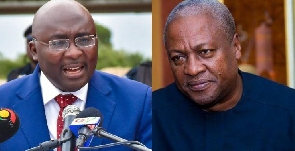With just 36 days to the December 7 election, the economic challenges facing the country have become the focal point of the contest between the former President John Dramani Mahama of the National Democratic Congress (NDC), and, Vice President Dr. Mahamudu Bawumia of the New Patriotic Party (NPP).
As the two candidates sharpen their messages, each of them have been presenting distinct visions aimed at addressing the pressing economic issues that affect everyday Ghanaians, making the pending election a critical moment for the country's economic future.
John Dramani Mahama is promoting a '24-Hour Economy' framework that seeks to maximize productivity and economic activity by enabling businesses to operate around the clock.
This initiative emphasizes the need for infrastructure improvements, enhanced energy management, and supportive policies for entrepreneurship and job creation.
Through the proposed 24-hour economy, Mahama believes Ghana can effectively tackle unemployment and stimulate growth across various sectors.
In contrast, the NPP is pushing its "Bold Solutions for the Future" initiative, which focuses on leveraging technology to improve agricultural practices and reduce post-harvest losses.
This program aims to enhance food security, stimulate job creation, and bolster the economy through advanced cold storage systems.
The NPP argues that such innovative solutions are essential for a sustainable economic future and will help modernise the agricultural sector, while reducing reliance on food imports.
As the two presidential candidates lay out their economic visions, the discourse has even moved a step further.
During a recent campaign, Mahama criticised Bawumia for failing to directly answer pressing questions on Ghana's economy.
“I woke up this morning and saw 50 questions from him. It looks like our Vice President has just memorized these things, like we used to learn poems in primary school," he indicated.
Mahama indicated that his enquiries are straightforward and critical for the public.
“I asked you five simple questions that Ghanaians want you to answer, and instead, you respond with, ‘How many compost plants did you build?’ That’s not the issue in Ghana today," he noted.
The five key economic questions he asked Bawumia targeted what he perceives as significant shortcomings in the current administration's economic management.
He pressed Bawumia to explain the depreciation of the cedi against major currencies and questioned the reasons behind Ghana's rising national debt.
Mahama further demanded clarity on strategies for controlling inflation, addressing youth unemployment, and the administration’s apparent shift from economic management to digitalization initiatives, which he believes do not adequately confront the country’s core economic challenges.
In response to Mahama’s critique, Dr. Bawumia also posed a comprehensive list of 50 counter-questions that cover various aspects of governance and economic policy.
His questions included topics on Mahama's handling of the power crisis, cancellations of allowances for healthcare professionals, and measures taken to combat corruption.
He also highlighted the government's efforts in digital transformation and infrastructure development, arguing that these initiatives are crucial for the nation’s progress.
Despite Bawumia's expansive approach, Mahama contended that the vice president's responses fail to engage with the urgent economic questions that impact the lives of ordinary Ghanaians.
“You don’t need a debate to answer the five questions. When you asked Amissah Arthur the five equations, you didn’t agree to a debate for him to answer them. Ghanaians are asking you five simple questions, just answer them,” he urged.
Mahama further asserted, “Even if you look at the 50 questions, he has skillfully avoided the economy. There is nothing about the economy in those 50 questions. Why are you running away from the economy? Because you were brought in to fix the economy. The economy is now in a terrible state; just answer the five questions I have asked you on behalf of the people of Ghana, simple", he noted.
Dr. Mahamudu Bawumia, on the other hand, has reiterated his call for a debate to set the records straight.
"I have just read questions posed to me by former President Mahama. I would have thought he would be man enough to face me in a one-on-one debate for the Ghanaian public to assess our respective policies, achievements, and visions. He should not hide behind these flimsy questions to avoid a debate. Come for a debate, and I can ask the moderators to ask me these five flimsy questions," he replied.
He then proceeded with some questions: "Can you name any broad-based social intervention policy that you implemented in Ghana as President? Why did you run advertisements against free SHS? If you think your economic management was so good, how come we experienced more than four years of Dumsor under your government? Why did the banking system almost collapse under your government? Why did you cancel teacher training allowances? Why did you cancel nursing training allowances?"
As the campaign intensifies, it has become evident that economic issues will play a decisive role in shaping voters' decisions.
Ghanaians are keenly aware of the challenges facing the economy, including inflation, unemployment, and public debt.
Mahama's focus on direct accountability contrasts with Bawumia's broader agenda of digitalization and infrastructure development.
Ultimately, the candidates’ ability to resonate with the electorate on these pressing economic matters may determine the outcome of the election.
With the stakes high, voters will soon decide which vision for Ghana's economic future they will support.
JKB/AE
You can watch a compilation of the Twi news below:
Politics of Friday, 1 November 2024
Source: www.ghanaweb.com

















